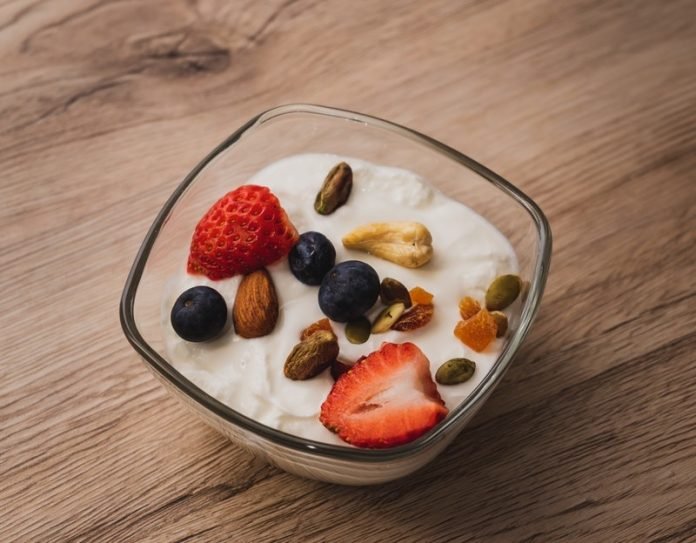
In a new study from the University of Maryland, researchers found eating yogurt containing a particular strain of a well-studied probiotic appears to protect against harmful changes in the gut microbiome that are associated with antibiotic use.
They found that yogurt containing the probiotic Bifidobacterium lactis BB-12 worked better than a placebo at maintaining the community of bacteria in the colon.
This finding provides important new insights into the mechanisms by which the probiotic, BB-12, may protect against antibiotic-associated diarrhea.
About one in five people who take antibiotics develop antibiotic-associated diarrhea due to the drugs disrupting the healthy gut microbiome.
Patients may stop taking their medications early after developing diarrhea, which could cause their original infection to persist.
A small percentage may develop a life-threatening infection with the bacteria C. difficile, which can reside in the gut but is usually kept in check by good bacteria in the microbiome.
In the study, 42 healthy volunteers were assigned to consume a daily serving-size container of yogurt containing BB-12 along with a standard week-long regimen of the antibiotic amoxicillin-clavulanate.
They continued to consume the yogurt every day for a week after finishing the antibiotic.
An additional 20 participants served as the control group and were assigned to consume a daily yogurt without the probiotic for two weeks while also taking the same antibiotic regimen.
The researchers found that levels of the short-chain fatty acid acetate, a beneficial metabolite produced by the microbiota, were reduced in all subjects after taking the antibiotic.
However, the reduction in acetate was much greater in people receiving the placebo yogurt as compared with BB-12 supplemented yogurt.
Acetate levels in subjects who received BB-12 also returned to baseline levels by 30 days, while they remained below baseline in subjects receiving the placebo.
The team says starting the probiotic as early as possible, before the antibiotic symptoms have progressed, may result in a greater opportunity for the probiotic mechanisms to be expressed and may ultimately lead to more beneficial clinical outcomes.
If you care about nutrition, please read studies about this nutrient supplement may help prevent severe COVID-19, boost recovery and findings of this nutrient in your diet may protect against high blood pressure.
For more information about nutrition and your health, please see recent studies about this common nutrient is good for your heart rate and results showing that this nutrient could be key to new diabetes treatments.
The study is published in Nutrients. One author of the study is Claire Fraser, Ph.D.
Copyright © 2021 Knowridge Science Report. All rights reserved.



